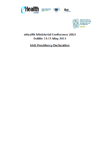
Announcing the agreement of the Declaration, Irish Minister for Health James Reilly, T.D. said "I am pleased that my fellow Health Ministers from across the European Union recognise the benefits that ICT can bring to the health sector. On behalf of the Irish Presidency I welcome the 'eHealth Action Plan 2012 - 2020 - Innovative healthcare for 21st century'. The development of what we call eHealth ecosystems will not only result in better health outcomes for citizens of all member states, but will also bring economic benefits through the development of new technologies and increased employment opportunities. The agreement of this Declaration demonstrates our collective commitment to making eHealth ecosystems a reality as we continue a process of reform of our health systems across Europe."
The objectives of an eHealth ecosystem are to promote private and public sector innovation on a cooperative basis; ensure a vibrant economy for the deployment of eHealth applications; and support national, regional health and social care strategies. Minister Reilly continued "as Health Ministers we recognise that there are significant challenges to effectively developing eHealth ecosystems. But we believe that these challenges can be overcome through working collaboratively with the key stakeholders in the health family. Stakeholders such as patients and carers, research organisations, health and social care providers, industry leaders, and regulatory authorities are central to ensuring success in this area. Part of our commitment today is to engage fully with all these stakeholders."
As part of the Declaration Minsters agreed to the following actions:
- Strengthening coordination of all policies related to eHealth.
- Promoting an ecosystem dialogue aimed at mutual learning and sharing of good experiences between industry, academia, patients, citizens and the health service.
- Accelerating the implementation of existing and proven devices and processes to create an innovative market and to ensure that citizens receive optimum outcomes in a shorter timeframe, by delivering on existing priorities.
To support these actions Minister Reilly, on behalf of the Irish Presidency, called on Member States to enhance their cooperation on eHealth and called on the European Commission to support Member States in their efforts to deploy eHealth solutions through ecosystems, utilising the appropriate tools and instruments available.
Download: eHealth Irish Presidency Declaration (.pdf, 139 KB).
Download from eHealthNews.eu Portal's mirror: eHealth Irish Presidency Declaration (.pdf, 139 KB).